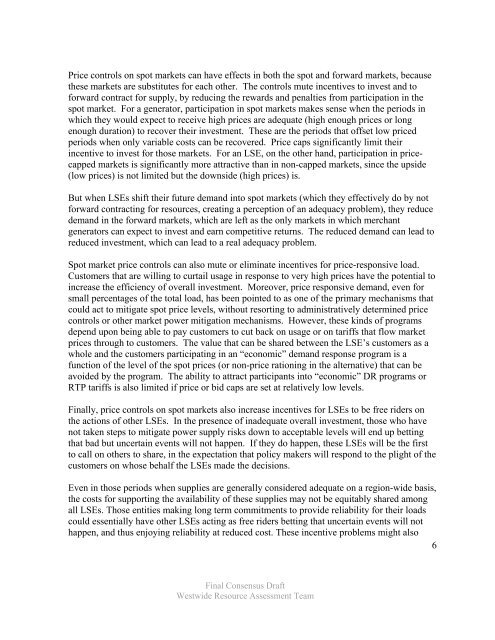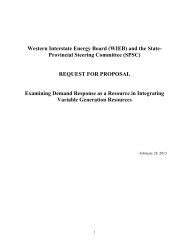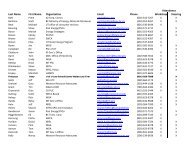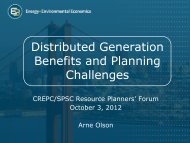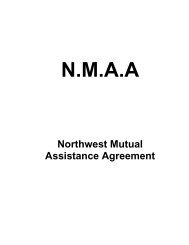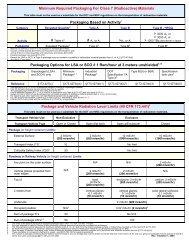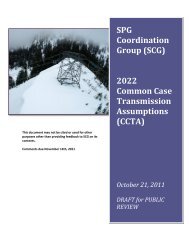WRAT Final Briefing Paper - Western Governors' Association
WRAT Final Briefing Paper - Western Governors' Association
WRAT Final Briefing Paper - Western Governors' Association
You also want an ePaper? Increase the reach of your titles
YUMPU automatically turns print PDFs into web optimized ePapers that Google loves.
Price controls on spot markets can have effects in both the spot and forward markets, because<br />
these markets are substitutes for each other. The controls mute incentives to invest and to<br />
forward contract for supply, by reducing the rewards and penalties from participation in the<br />
spot market. For a generator, participation in spot markets makes sense when the periods in<br />
which they would expect to receive high prices are adequate (high enough prices or long<br />
enough duration) to recover their investment. These are the periods that offset low priced<br />
periods when only variable costs can be recovered. Price caps significantly limit their<br />
incentive to invest for those markets. For an LSE, on the other hand, participation in pricecapped<br />
markets is significantly more attractive than in non-capped markets, since the upside<br />
(low prices) is not limited but the downside (high prices) is.<br />
But when LSEs shift their future demand into spot markets (which they effectively do by not<br />
forward contracting for resources, creating a perception of an adequacy problem), they reduce<br />
demand in the forward markets, which are left as the only markets in which merchant<br />
generators can expect to invest and earn competitive returns. The reduced demand can lead to<br />
reduced investment, which can lead to a real adequacy problem.<br />
Spot market price controls can also mute or eliminate incentives for price-responsive load.<br />
Customers that are willing to curtail usage in response to very high prices have the potential to<br />
increase the efficiency of overall investment. Moreover, price responsive demand, even for<br />
small percentages of the total load, has been pointed to as one of the primary mechanisms that<br />
could act to mitigate spot price levels, without resorting to administratively determined price<br />
controls or other market power mitigation mechanisms. However, these kinds of programs<br />
depend upon being able to pay customers to cut back on usage or on tariffs that flow market<br />
prices through to customers. The value that can be shared between the LSE’s customers as a<br />
whole and the customers participating in an “economic” demand response program is a<br />
function of the level of the spot prices (or non-price rationing in the alternative) that can be<br />
avoided by the program. The ability to attract participants into “economic” DR programs or<br />
RTP tariffs is also limited if price or bid caps are set at relatively low levels.<br />
<strong>Final</strong>ly, price controls on spot markets also increase incentives for LSEs to be free riders on<br />
the actions of other LSEs. In the presence of inadequate overall investment, those who have<br />
not taken steps to mitigate power supply risks down to acceptable levels will end up betting<br />
that bad but uncertain events will not happen. If they do happen, these LSEs will be the first<br />
to call on others to share, in the expectation that policy makers will respond to the plight of the<br />
customers on whose behalf the LSEs made the decisions.<br />
Even in those periods when supplies are generally considered adequate on a region-wide basis,<br />
the costs for supporting the availability of these supplies may not be equitably shared among<br />
all LSEs. Those entities making long term commitments to provide reliability for their loads<br />
could essentially have other LSEs acting as free riders betting that uncertain events will not<br />
happen, and thus enjoying reliability at reduced cost. These incentive problems might also<br />
6<br />
<strong>Final</strong> Consensus Draft<br />
Westwide Resource Assessment Team


